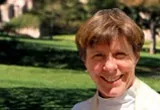Everyone is Illuminated

Joyce Tompkins is the Religious Advisor to the Campus Protestant Community. Other Spiritual Reflections are available on the Religious Advisor's page.
You can write to Joyce at jtompki1@swarthmore.edu
Everyone is illuminated. In my first week as chaplain at Swarthmore, five years ago, I ordered pizzas and sat in Parrish Parlors, one of the informal gathering places for students in the main administration building, near the student mailroom. A sign said “FREE PIZZA “ in big bold print, and underneath, in smaller letters “Religious and Spiritual Life.”
A group of students had already gathered around, enjoying the food and talking with one another. I noticed a young man peering around the doorway, looking hungry. “Come in and have some pizza!” I said to him, smiling and beckoning. A look of terror came over his face as he eyed the pizza, nearly salivating in his desire for a piece. He took a small step into the room and then froze. One hand reached toward the pizza and the other clapped itself on the reaching wrist. “I can’t! I’m not religious!” he stammered, and rocketed away.
This week is Religion and Spirituality on Campus week here at Swarthmore. I wonder: Is there a more alienating and divisive word in our modern era than “religious?” On campus, we are careful to add “spiritual,” a broader term that seems to be regarded as more welcoming. Especially among college students, there are many who choose not to identify with a particular religious tradition, or reject the legitimacy of religion altogether. Yet most will admit to some kind of spirituality, even if only the most vague and unexamined variety.
The trend on many academically elite campuses, not just Swarthmore’s, has been toward the secular. In our desire not to privilege the Protestant Christian majority that formed American higher education, we have embraced a pluralism that celebrates culture but frowns upon religion. But secularism should mean that all voices are heard, not that the religious voice is excluded. Students need to feel free to express their spiritual natures, whatever form that might take, even in a fiercely intellectual place like Swarthmore. Especially here. The life of the mind must be balanced by the heart and the spirit. There must be opportunities to discuss the big questions of meaning, identity, and purpose. We need to be more than bright thinkers. We need to become whole.
At Swarthmore, which was founded by Quakers, we are privileged to have the language of the Friends at our disposal to communicate this broader sense of spiritual life. There is an inner light in all people, all beings. We hold one another in the Light, and feel no compunction to define that Light more narrowly. Everyone is illuminated. And everyone can be fed. Hearts, minds and yes – pizza too.



